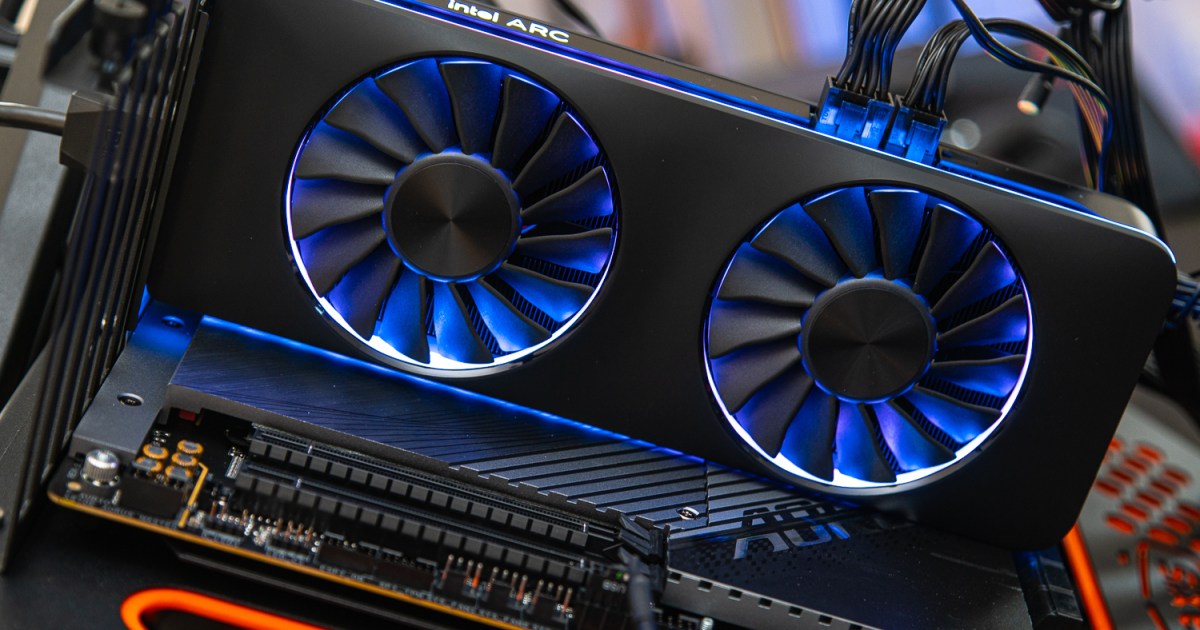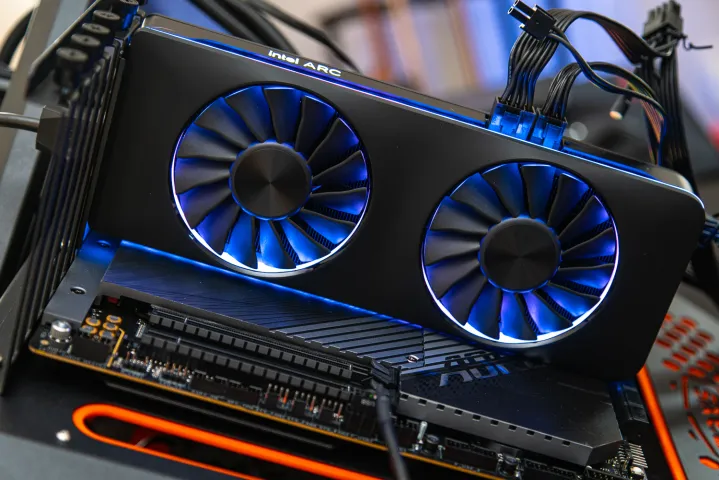
Despite a rocky start, Intel’s Arc GPUs are now among the best graphics cards you can buy. Targeting budget PC gamers, Intel has established itself as a major player in gaming graphics cards, and all eyes are on Team Blue with its next generation of GPUs, codenamed Battlemage.
We know Battlemage GPUs are coming, and Intel has slowly been dropping hints about the graphics cards over the past year. Although we’re still waiting on an official release date, specs, and pricing details for Battlemage GPUs, there’s a lot we can piece together already.
Intel Battlemage: specs
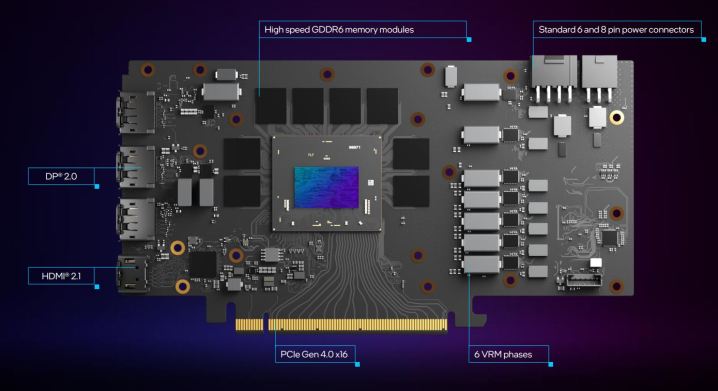
Intel hasn’t confirmed any specs for its Battlemage GPUs yet, but the rumor mill hasn’t been quiet about the hardware these GPUs could pack. Originally, leakers like RedGamingTech claimed the flagship card would come with 64 Xe cores — double what’s available on the A770 we have now, and with an entirely new architecture in tow. The latest speculation is a little bit different, however.
At the beginning of the year, RedGamingTech revised their rumor, saying that the flagship GPU would come with 56 Xe cores. That’s still a massive bump over the A770. In addition, the leaker claims the card can reach clock speeds of up to 3GHz and come with a massive 112MB of L2 cache.
What really stands out about the leak is the Adamantine cache, however. This is a form of cache that Intel has developed for CPUs, and it’s not dissimilar from AMD’s 3D V-Cache — basically, you stack a bunch of extra cache on the die. It’s what you’d call a “Level 4” cache. It’s slow by cache standards, but RedGamingTech says Intel plans on packing a massive 512MB of Adamantine cache on the flagship chip.
In addition to the model with 56 Xe Cores, the leakers say a model with 40 Xe cores is in the works. This one seems a bit more grounded in reality, packing the aforementioned cores, a 192-bit memory bus, and none of the Adamantine cache. RedGamingTech speculated that this design might claim the flagship slot, citing the poor margins that could come from the 56 Xe core model.
It’s possible the final specs aren’t nailed down yet, but leaks point to one thing as a certainty — the flagship model will come with a boost to Xe cores. It appears Intel is working on two main models for Battlemage, similar to Alchemist, but we could see more variants after the first GPUs are here.
Intel Battlemage: pricing and release date

We expect Battlemage cards to show up in the second half of 2024, but they may materialize even sooner. At the beginning of the year, Intel’s Tom Petersen said that engineers on the graphics team are working on software for the next-gen GPUs and that hardware engineers have already moved onto “the next thing.” Battlemage, on the hardware front at least, is ready to go.
Adding more evidence to this is a recent shipping manifest showing two Battlemage GPUs. The manifest notes that these cards are “for R&D purposes only,” but sending hardware around suggests Intel is entering the final stages of validation. In addition, Intel itself shared a slide with Japanese media outlets showing a new GPU launching in 2024.
Leakers don’t agree with this timeline, however. Leaker Moore’s Law is Dead cites Intel sources claiming that Battlemage is targeting a very late 2024 or early 2025 release. That’s despite an early road map shared last year that showed GPUs launching between April and June of 2024.
The latest leak lines up with this time frame. ComputerBase reported that Intel would launch the GPUs before Black Friday in preparation for the holiday season.
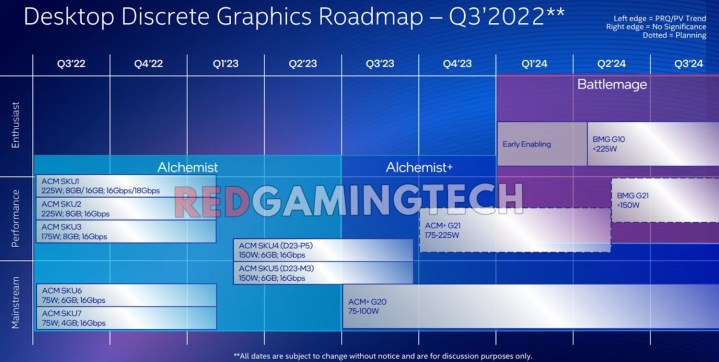
At this point, we’re waiting for Intel to share more. Intel has a keynote presentation at Computex this year, which takes place in June. If we see Battlemage later in the year, there’s a good chance Intel will share more about the graphics cards then.
We won’t know anything about pricing until Intel has more to share. However, there’s a good chance Intel will focus on budget and midrange cards rather than expensive flagships like the RTX 4090. That’s what we saw with the Arc A770 and A750 in the previous generation. Intel’s stance with Arc since its inception has been valuable, and I don’t suspect it will abandon that idea with Battlemage.
Given the specs we know about, I suspect the flagship card will arrive around $500. That’s pure speculation right now, so don’t treat it any differently. Based on the specs, it appears Intel is designing a more powerful flagship with Battlemage that will likely command a higher price, and we’ve seen with GPUs like the RX 7900 GRE from AMD and the RTX 4070 from Nvidia how important this price bracket is.
Intel Battlemage: architecture

Intel calls the architecture behind Battlemage Xe2, following up on the Xe architecture we saw with Alchemist graphics cards. Leakers have shared a few details about what this next-generation architecture will entail, but we’re light on concrete details.
For starters, there’s a good chance Intel will stick with semiconductor manufacturer TSMC for Battlemage. We don’t know what node Intel will use, but rumor has it that Battlemage will use the N4 node. There are multiple variations of this node, some of which are being used in Nvidia’s next-gen data center GPUs named Blackwell, so it’s not clear if Intel will stick with a vanilla version or not.
For Battlemage, Intel says it’s simplifying its lineup. With the first Xe architecture, Intel built it to scale from low-power laptops up to data center GPUs. Intel’s Tom Petersen says that Xe2 will have a more streamlined lineup. You’ll get Xe2-LPG for lower-power applications, and Xe2-HPG for high-performance discrete GPUs.

According to a leaked internal slide, shared by RedGamingTech, Xe2-HPG will feature a “next-gen memory subsystem and compression,” as well as improved ray tracing and micro-architectural improvements. That first note stands out. Last year, Intel published a research paper detailing AI-driven compression to get around VRAM issues in modern games. We could see that tech leveraged as part of the architecture of Battlemage.
Intel Battlemage: Performance
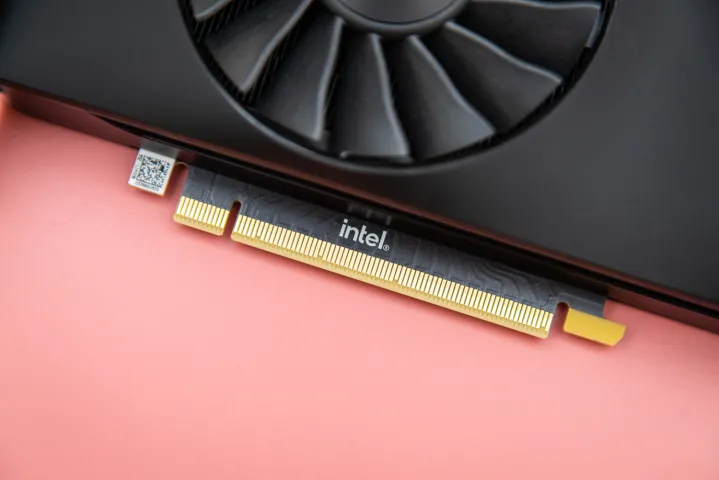
We don’t know about Battlemage’s performance, and the few leaks that have come out don’t provide any hints. Intel has confirmed it’s working on software for Battlemage now, and we saw how important that was in the previous generation. We won’t get an accurate picture of performance until the cards are actually here.
Based on the specs, there’s a good chance Intel is targeting the RTX 4070 with its flagship Battlemage GPU. That’s probably a good call, too. There are half a dozen GPUs in the price bracket between $400 and $600, making it the most competitive part of the graphics card market right now.
Originally, rumors claimed Intel would target the RTX 4080 for its flagship card, but that seems unlikely. This rumor likely spread due to the size of the actual GPU inside the flagship card, which is rumored to be around the same size as the RTX 4080. That may be true, but that doesn’t mean the card will be able to reach the levels of the RTX 4080. Intel may pack more hardware in the cards than it needs, similar to Alchemist GPUs.
Lower down the stack, it’s hard to say. All we have now is a leaked SiSoftware benchmark showcasing Battlemage in Intel’s Lunar Lake laptop CPUs. Regardless, Intel likely won’t compete with the next generation of GPUs from AMD and Nvidia. Based on the timeline we have now, it seems Intel is trying to get a few months on the market before AMD and Nvidia release their next-gen graphics cards.
Intel’s big claim at the moment is that Battlemage delivers a 50% improvement compared to the previous architecture. That’s inside of Lunar Lake chips, so it remains to be seen if Intel can deliver the same improvement with its desktop graphics cards.
Editors’ Recommendations

